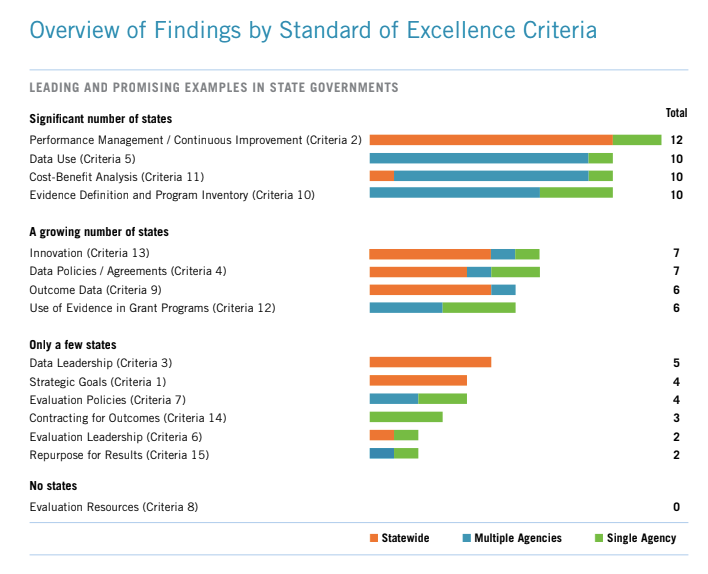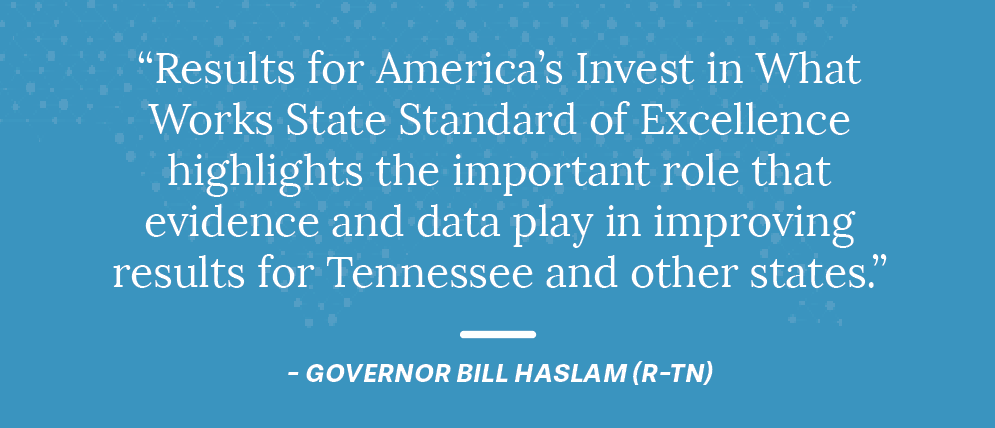At Results for America, we believe deeply in the power of evidence and data to transform the way governments improve outcomes for children, families and communities.
We’re seeing it in cities. We’re seeing it in pockets of the federal government. And increasingly, we’re seeing this progress in states all across the country.
Today, we are proud to release our first-ever 2018 Invest in What Works State Standard of Excellence, which highlights how governors and state agency leaders — in red states and blue states — are using data and evidence to get better results for their residents.
The Invest in What Works State Standard of Excellence is intended to be a “north star” for state policymakers — a national standard to help guide states in using data, evidence, and evaluation to help drive budget, policy, and management decisions.
Our goal: To see innovative practices like these embraced nationwide — in every state and every agency in every state.
This year’s State Standard of Excellence features 88 leading and promising data-driven and evidence-based practices, policies, programs, and systems that are currently in effect in 30 state governments across the country.
We identified these practices across 15 criteria, from “Data Leadership” to “Evaluation Policies” to “Contracting for Outcomes” to the “Use of Evidence in Grant Programs” to “Repurposing for Results.”
Here are just a few of the leading and promising practices:
- Rhode Island’s Department of Children, Youth, and Families moved to a results-driven procurement process, which helped reduce the number of children in group care by nearly 20 percent.
- The Washington Department of Social and Health Services created an integrated database to track outcomes for its clients, and saved $10 million by better coordinating care for high-risk Medicaid patients.
- Colorado — already known for its performance dashboard, Evaluation and Action Lab, and Performance Management Academy — showed how changing the wording of tax notifications could boost the payment of delinquent taxes by 4.1 percent — at no additional cost.
- California’s Franchise Tax Board generated $3.7 billion in additional revenue (and $1 billion annually on a recurring basis) by modernizing systems, improving data analytics and offering new self-service options for taxpayers.
- Oregon shifted 75 percent of funding for critical priorities in criminal justice and mental health toward evidence-based strategies.
- Minnesota is using savings from reducing sentences for minor drug offenders to invest in evidence-based drug and mental health treatments for those in prison and under supervised release.
- Tennessee’s Transparent TN website offers performance data on how the state is meeting its goals, including a searchable checkbook which reveals how state dollars are being spent.
Overall, we found that a significant number of states are using performance management systems (12 states), linking data across programs and agencies to improve results (10 states), conducting cost-benefit analysis to quantify outcomes (10 states), and defining evidence and conducting inventories of evidence-based programs (10 states).
A growing number of states have data-sharing policies and agreements (7 states), are implementing innovative new models to improve outcomes (7 states), are reporting outcome data during their budget process (6 states), and requiring that a portion of grant funds be spent on evidence-based programs (6 states).
However, fewer states have designated chief data officers with budget and policy authority (5 states), set statewide strategic goals (4 states), established evaluation policies (4 states), contracted for outcomes (3 states), hired senior leaders with the authority, staff and budget to evaluate programs (2 states) and repurposed funds away from programs that consistently fail to deliver results (2 states). No states were identified as investing at least 1 percent of program funds in evaluations.

We identified five states as leading the way with their use of the data-driven and evidence-based examples: Washington, Colorado, Oregon, Minnesota, and Tennessee. These states have made significant strides towards creating a statewide ecosystem for consistently and effectively using data and evidence as decision-making tools to achieve better outcomes.

You can read our full analysis here. Our findings are based on data provided under license by the Pew-MacArthur Results First Initiative* — which was used to inform its excellent 2017 report on states’ engagement in evidence-based policymaking. Since 2011, the Pew-MacArthur Results First Initiative has worked with states to implement an innovative evidence-based policymaking approach to help state leaders advance policies and programs that are proven to work.
Our findings also are based on input from more than 90 current and former state government officials and experts. We are indebted to the Laura and John Arnold Foundation for their assistance and dedication to advancing evidence-based policymaking.
For states looking to adapt and replicate these efforts, our state standard is packed with links to resources including performance dashboards, strategic plans, research agendas, executive orders, laws, data-sharing agreements, evaluation policies, and much more. We encourage state leaders to share additional examples of their data-driven and evidence-based efforts with us, which we will highlight in the months and years to come.

We believe standards of excellence encourage the spread of best practices, inspire a friendly competition between policymakers and challenge leaders of both parties to develop new data-driven innovations.
We have seen this with Results for America’s Federal Invest in What Works Index, which is accelerating efforts by federal agencies to use data and evidence in budget, policy, and management decisions. We have seen it with our work on Bloomberg Philanthropies’ What Works Cities Certification, which is galvanizing city leaders nationwide to increase their use of data and evidence in their decision making. We are now developing a School District Standard of Excellence as well, which we hope will inspire innovation by local education leaders all across the country.
We will be highlighting the findings of the 2018 Invest in What Works State Standard of Excellence at an event with the National Governors Association today in Washington, D.C. An interactive version of this new roadmap will be posted on our website, and you can share your feedback by tweeting at @Results4America with the hashtags #InvestInWhatWorks and #StateStandard.
Michele Jolin is the CEO and Co-Founder of Results for America. David Medina is COO and Co-Founder of Results for America.
* The views expressed in the 2018 Invest in What Works State Standard of Excellence are those of Results for America and do not necessarily reflect the views of the Pew Charitable Trusts or the John D. and Catherine T. MacArthur Foundation.